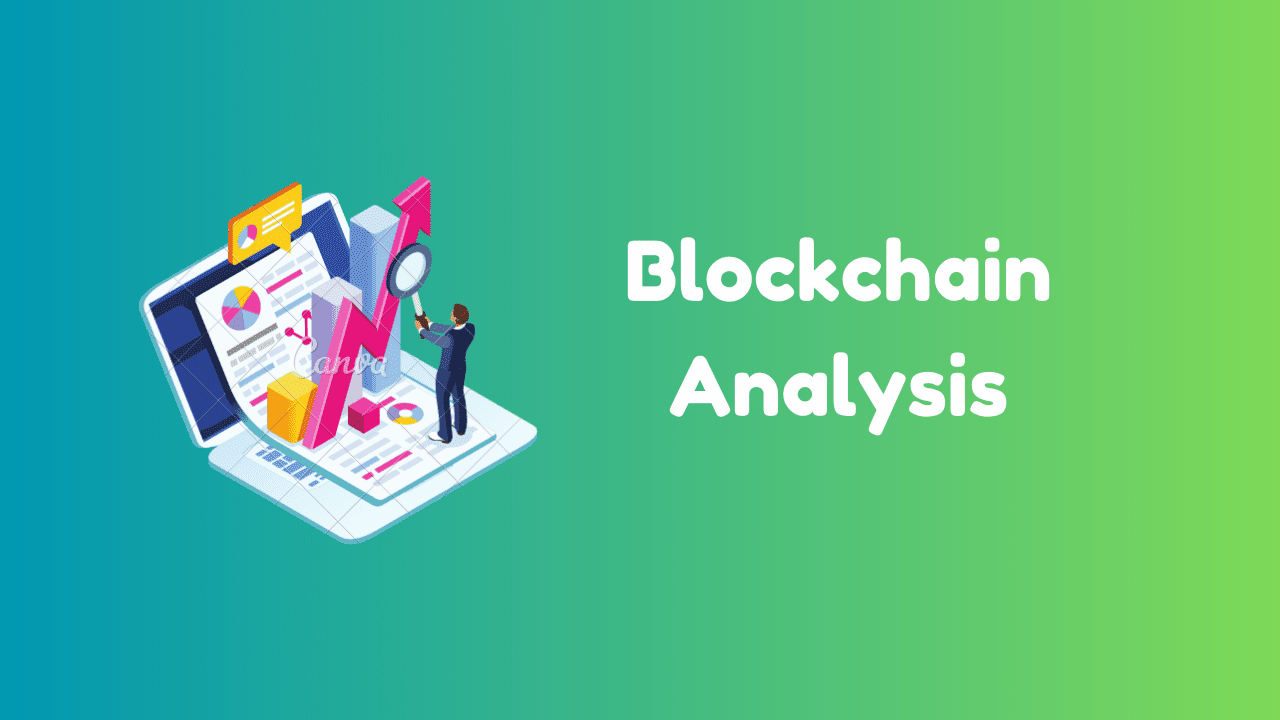Blockchain analysis involves carefully examining, recognizing, grouping, creating models, and visually depicting information within a cryptographic distributed ledger, commonly referred to as a blockchain.
This meticulous process is carried out by blockchain development companies and engineers basically to uncover patterns, connections, and insights within the recorded data.
To get the data stored in each block of the blockchain, analysts use blockchain analysis tools to scrutinize valuable details about transactions, addresses, and interactions that take place within the network.
It serves as a powerful tool for various sectors, including finance, law enforcement, and supply chain management, contributing to a more transparent and accountable digital landscape.
In this blog post, we will take a look at the need for blockchain analysis, the methods, and the tools used by engineers in the analysis of blockchain networks.
How Blockchain Works: A Brief Overview
Blockchain is a decentralized digital ledger that records transactions in a secure and transparent manner. Each block in the chain contains a unique code called a hash, which is generated based on the information in the block.
This hash is then used to link the block to the previous block in the chain, creating a secure and tamper-proof record of all transactions.
See also: How Does Blockchain Technology Work? Here’s The Best Answer
The Need for Blockchain Analysis
Is there any need for blockchain analysis? What is the benefit of analysis to companies and all the industries that make use of blockchain analysis tools?
The need for blockchain analysis is important in different sectors of an economy.
Firstly, companies and different kinds of businesses can benefit a lot from investigating the content of a block. It helps them detect any irregular patterns or fraudulent activities that might happen on a private blockchain.

Secondly, analysis enhances compliance and regulatory adherence. Industries that rely on blockchain technology, such as finance and supply chain management, must ensure that their activities align with legal and regulatory frameworks.
By analyzing blockchain data, companies in industries like finance and supply chain management can prove that they’re playing by the rules.
This builds trust with customers, partners, and regulators, and helps the business keep running smoothly without any legal troubles.
Also, the applicability of blockchain analysis extends to law enforcement agencies. In cases involving financial crimes and fraudulent activities, the ability to trace transactions and identify involved parties becomes key for investigations.
Blockchain analysis tools equip law enforcement agencies with the power to uncover crucial evidence, expedite investigations, and ensure justice.
In all, the ultimate aim of analyzing blockchain is to extract valuable insights about various entities involved in cryptocurrency transactions.
Methods of Blockchain Analysis

On-Chain Analysis
The technique of on-chain analysis entails a meticulous examination of data directly within the blockchain itself. This approach unfurls a rich tapestry of transaction intricacies, including transaction particulars, wallet addresses, and transaction histories. This methodology proves invaluable in mapping the journey of funds and unraveling intricate transactional patterns.
One way to check is by looking directly at the blockchain. It’s like reading the book of transactions. We can see who’s sending and receiving things and how much. This helps us understand the flow of stuff.
Off-Chain Analysis
Sometimes we need to look outside the blockchain too. We gather information from different places to see the bigger picture. This is like finding clues from different sources to solve a puzzle.
Off-chain analysis embarks on a journey beyond the precincts of the blockchain realm, extending its purview to encompass data emanating from external sources.
This panoramic approach provides a broader vista, offering insights into user behavior and interconnections that transcend the confines of the blockchain network.
The Merits of Graph Analysis
Graph analysis, an invaluable visual tool, endeavors to depict the intricate nexus of relationships within a blockchain ecosystem.

This tool works by ingeniously crafting visual representations of transactions and their interrelationships, in which analysts can be able to discern clusters, patterns, and potential vulnerabilities within a body.
To make things easier, graph analytics uses pictures to show how transactions are connected. These pictures show the patterns and understand what’s happening.
Blockchain Analysis Tools
The top blockchain analysis tools and companies are Chainalysis, TRM Labs, Elliptic, Nansen, CipherTrace, Elementus, Dune Analytics.
Chainalysis
Chainalysis is an eminent American blockchain analysis firm headquartered in the vibrant city of New York. Its inception took place in 2014 when three visionary individuals – Michael Gronager, Jan Moller, and Jonathan Levin – came together to establish this groundbreaking company.
Over the years, Chainalysis developed its proprietary financial crime investigation software. This software is not only a technological marvel but also a game-changer in the domain of cryptocurrency and blockchain analysis
TRM Labs
TRM Labs stands as a pioneering blockchain intelligence company that plays a pivotal role in enhancing the security and integrity of the financial landscape.
Its primary focus lies in aiding financial institutions, crypto-oriented businesses, and government agencies in the intricate task of detecting and investigating instances of financial crime and fraud related to cryptocurrencies.
The primary purpose of TRM Labs is to provide the best solutions that empower its clients to navigate the ever-evolving complexities of the crypto realm which includes detecting suspicious transactions, identifying potential risks, and uncovering illicit activities within the vast and intricate web of cryptocurrency transactions.
With headquarters in the innovation hub of San Francisco, California, TRM Labs provides its clients with blockchain analysis tools for monitoring, investigating, and screening cryptocurrency-related activities.
Some of the services offered are, but not limited to:
Cryptocurrency Anti-Money Laundering (AML): TRM Labs offers advanced AML solutions that enable organizations to identify and flag transactions that may be associated with money laundering or other illicit activities.
Transaction Monitoring: This includes live monitoring of cryptocurrency transactions to promptly identify and address suspicious or anomalous activities.
Wallet Screening: TRM Labs’ wallet screening solutions provide a mechanism for vetting cryptocurrency wallets.
Investigative Tracing: In cases of suspicious activities, TRM Labs equips organizations with the tools necessary to trace the origin and flow of funds within a blockchain.
Entity Risk Scoring (Know-Your-VASP): TRM Labs’ solutions offer entity risk scoring, enabling organizations to gauge the potential risks posed by different entities, such as Virtual Asset Service Providers (VASPs).

Elliptic
Since it was founded in 2013, Elliptic serves as a beacon of innovation and expertise, specializing in providing robust blockchain analysis solutions tailored to meet the intricate needs of crypto asset compliance.
With the ever-evolving landscape of cryptocurrencies, regulatory adherence, and risk management have emerged as paramount concerns for businesses operating within this sphere.
Elliptic steps forward to address these challenges head-on, empowering organizations to manage risk effectively across a vast array of crypto assets while fulfilling stringent regulatory requirements.
CipherTrace
CipherTrace is a prominent player in the world of cryptocurrency. It provides crucial services of blockchain analysis to banks, crypto exchanges, wallets, and other virtual asset service providers (VASPs).
Their focus is on enabling secure and compliant cryptocurrency transactions while reducing risks and preventing fraud.
By helping businesses adhere to regulations and fostering transparency, CipherTrace plays a vital role in ensuring the safe integration of cryptocurrencies into the financial ecosystem.
Elementus
Elementus offers a blockchain analytics platform that enhances the transparency of blockchain technology.
It provides insights from blockchain activities, helping to identify security risks, expose malicious actors, and offer market intelligence for informed investments in digital assets.
This contributes to building trust and accountability within the blockchain ecosystem, benefiting businesses, investors, and the overall blockchain community.
Dune Analytics
Dune Analytics is a powerful platform that offers a range of services to help users explore and understand blockchain data
The platform supports multiple blockchains, including Ethereum, Otimism, and Gnosis Chain.
Dune Analytics was founded in March 2019 by two individuals from Oslo, Norway: Fredrik Haga and Mats Olsen.
The founders initially built smart contracts together at a Norwegian media company but left when they realized the corporation wasn’t embracing crypto. This led them to create Dune Analytics. Their initial focus was Ethereum data, and though they faced challenges in getting funding initially
Final Words
Blockchain analysis tools are really helpful. They help us see what’s going on with on-chain transactions and understand what’s happening in the market.
But, it’s important to understand that these tools have their own difficulties and things to think about. The accuracy and usefulness of the information they provide depend a lot on the quality of the data they use and the expertise of the people using them.


